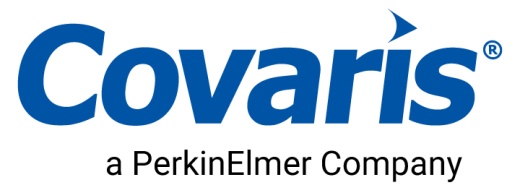Industry talks:
Preomics
Quentin Enjalbert (Head of Sales EMEA, Preomics)
Title of the talk: Enhanced biomarker discovery in blood plasma through a unique single-particle workflow for deeper proteome coverage
Blood plasma represents an invaluable source for proteomic biomarker discovery as it is easily accessible and provides comprehensive information about an individual´s health status. However, the high dynamic range as well as sample heterogeneity and complexity pose significant challenges for LC-MS-based proteomics, limiting access to the entire proteome. With ENRICHplus, we introduced a robust plasma workflow that allows deeper insights into the plasma proteome, and we evaluated here its potential to enhance biomarker discovery
Covaris
Dr. Martin Grafe (Covaris)

Title of the talk: Advancing Proteomics Sample Preparation with Adaptive Focused Acoustics (AFA®)
Proteomics research demands robust and reproducible sample preparation workflows to ensure high-quality data. However, challenges such as incomplete protein extraction, inefficient digestion, and sample variability persist. To address these issues, Covaris has developed a suite of novel sample preparation offerings powered by Adaptive Focused Acoustics® (AFA®) technology, specifically designed for FFPE tissue, fresh frozen samples, and mammalian cells.
AFA-enabled workflows streamline protein extraction, purification, and digestion, improving efficiency and scalability. Our solutions include optimized workflows for cells and FFPE, with the flexibility to address different proteomics applications. The truPREP® Protein solution for FFPE provides a modular approach to deparaffinization and protein extraction while maintaining protein integrity. The truPREP® Protein workflow for Mammalian Cells supports a wide range of initial cell counts (1,000 - 500,000 cells), providing a standardized, yet flexible, approach. Fresh frozen tissue preparation is enhanced by optimized AFA-based homogenization, ensuring full tissue disruption and high-yield protein extraction.
Key advantages of AFA-driven proteomics workflows include:
- Enhanced protein extraction efficiency, even from challenging matrices such as FFPE
- High reproducibility and scalability, supporting both low- and high-throughput applications
- Seamless integration with existing protocols (e.g., SP3 purification)
Covaris’ AFA technology continues to set new standards for efficient and high-throughput proteomics sample preparation, enabling researchers to streamline sample processing, improve protein recovery, and ensure reproducible results across various sample types.
Bucher Biotec & Quantum-Si
Jean-Baptiste Pénigault (Commercial Business Development Manager, Bucher Biotec & Quantum-Si)
Title of the talk: Next-Generation Protein Sequencing: Complementing Mass Spectrometry in the Proteomics Toolkit
Next-Generation Protein Sequencing™ (NGPS™) is a single-molecule technology that provides detailed insights into protein variants, proteoforms, and amino acid substitutions that are challenging to detect with mass spectrometry (MS).
At the core of Platinum Pro® by Quantum-Si, NGPS employs cycles of N-terminal amino acid recognizer binding and aminopeptidase cleavage to enable parallelized sequencing of individual peptide molecules. Unlike MS, NGPS does not rely on mass or charge for sequencing, offering an orthogonal and complementary approach. Studies have demonstrated its ability to sequence key protein regions that MS struggles to cover, addressing MS proteotypicity blind spots—such as the differentiation of leucine and isoleucine.
Beyond sequence analysis, NGPS is proving valuable in protein barcoding, a powerful tool for multiplexed protein identification and characterization. By tracking protein affinity, location, and expression with high precision, NGPS enhances applications ranging from protein engineering to nucleic acid therapy development. A recent bioRxiv study highlights its advantages over traditional MS-based barcode detection methods, which often face limitations in quantification, cost, and accessibility. By integrating a protein barcoding workflow with the benchtop Platinum Pro® protein sequencer, NGPS streamlines expression construct design, reducing hands-on time and input requirements.
With its ease of implementation and interpretation, NGPS is emerging as a key technology to complement MS, addressing some of its limitations and expanding the proteomics arsenal.
Standard BioTools
Dr. Eshita Mutt (Standard BioTools)

Title of the talk: Expanding Proteomic Horizons: How high-plex SomaScan Complements Mass Spectrometry
Unraveling biomarker discovery requires a comprehensive approach to protein profiling in most research studies, and SomaScan technology offers an innovative solution that seamlessly complements mass spectrometry (MS). The SomaScan Assay, powered by SOMAmer® reagents, enables high-throughput, high-plex affinity proteomics, measuring 11,000 protein interactions from just 55 µL of sample across not only complex matrix like human Plasma & Serum but also diverse biofluids, non-human plasma/serum and tissues, with excellent reproducibility (median CV ~5%). The primary technology of SOMAmer reagents are aptamers that are custom-engineered to have enhanced shape complementarity to their targets, as well as slow off rates for longer target binding
While MS remains the widely used method for deep proteomic characterization, it faces challenges in detecting low-abundance proteins, analyzing large sample sets efficiently, and navigating complex sample preparation workflows. By integrating SomaScan into their pipeline, MS users can accelerate discovery, identify novel biomarkers, and streamline large-scale protein profiling efforts with high sensitivity, broad dynamic range, and minimal sample requirements.
By leveraging the strengths of both SomaScan and Mass spectrometry, researchers gain a more complete and actionable view of at least half of genetically encoded human proteome. SomaScan’s high-plex profiling efficiently screens for protein interactions, signaling pathway changes, and disease progression markers, helping researchers quickly pinpoint key candidates for further MS-based structural and functional characterization. This synergy is invaluable in applications spanning drug discovery, personalized medicine, and translational research, where high-throughput biomarker identification and validation are crucial. By adopting SomaScan as a front-end discovery tool and MS for in-depth validation, scientists can maximize their proteomic insights, improving the efficiency and impact of their research at every stage of biomarker discovery and therapeutic development.
Bruker
Dr. Torsten Müller (Business Development Manager, Proteomics, Bruker)
Title of the talk: Advancing 4D-Proteomics™ in the Post-Genomic Era with timsTOF and PASEF
The timsTOF mass spectrometer portfolio continues to drive innovation in proteomic research, with the latest advancements presented at the American Society for Mass Spectrometry (ASMS) conference. By harnessing Trapped Ion Mobility Spectrometry (TIMS) and Parallel Accumulation Serial Fragmentation (PASEF), timsTOF instruments deliver unmatched sensitivity, speed, and dynamic range for comprehensive proteomic analysis. The integration of 4D-Proteomics™ methodologies—including CCS-enabled data acquisition, dia-PASEF, and prm-PASEF—along with newly developed advanced PASEF methods such as miDIA-PASEF and thunder-PASEF, further enhances protein identification and quantification accuracy. These cutting-edge technologies enable deeper insights into complex biological systems, supporting both bulk and single-cell proteomics. Unlock new possibilities in biomarker discovery, drug development, and clinical research as we explore the transformative potential of timsTOF in unravelling the complexities of the proteome.
Evosep
Dr. Britta Diedrich (Sales Specialist DACH, Evosep)

Title of the talk: Efficient proteomics with an automated sample preparation strategy leveraged by Evotip Pure and Whisper Zoom methods
The Whisper Zoom methods provide a significant improvement in performance for high sensitivity and cutting-edge LC-MS proteomics. They are designed to considerably improve performance and maximize recovery of the sample to deliver unmatched sensitivity and robustness. The required robustness is accelerated by the Evotip Pure, which is the core technology of Evosep One workflow. It enables consistently low carry-over, minimal sample losses, and allows for long-term capture and storage of samples. Partial elution from the Evotip Pure retains unwanted materials on the tip and protects the analytical system without sacrificing the recovery of the peptides. These key features are relevant to a wide range of sample types but are particularly important in handling of low-amount samples.
As large-scale proteomics becomes more widely adopted, costs and sustainability concerns arise. Miniaturization of workflows are required to reduce costs when scaling. Automation helps to reduce sample input amount, lower the consumption of enzymes and other reagents while simultaneously enabling highest sensitivity proteomics workflows.














